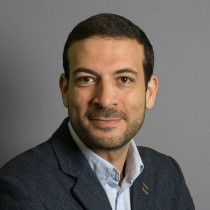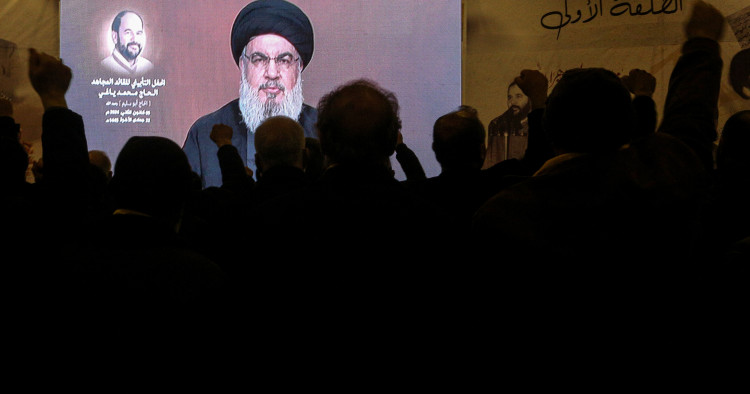Contents:
- Despite mediation efforts, the risk of an all-out Israel-Hezbollah war is rising rapidly
- When it comes to Netanyahu, cynicism is appropriate
- More turbulence in US-Israel relations complicates long-term policy coordination
- West Bank annexation put on the fast track
- With little likely to change, voters are apathetic about Iran’s presidential election
- Hajj deaths from extreme heat underscore severity of climate change impacts
- High death toll at the Hajj, including disproportionate number of Egyptians, could have been avoided
Despite mediation efforts, the risk of an all-out Israel-Hezbollah war is rising rapidly
Randa Slim
Senior Fellow and Director of Conflict Resolution and Track II Dialogues Program

-
The war of words between Hezbollah and Israel continues to escalate, with Hezbollah Secretary-General Hassan Nasrallah stating in a speech on June 19 that if Israel were to mount a large military offensive against the group, there will be “no rules” and “no ceilings” to its response.
-
Neither Hezbollah nor Israel wants the border clashes between them to devolve into an all-out war, but the gap between their positions on launching a diplomatic process to resolve their conflict is unbridgeable in the absence of a cease-fire deal in Gaza.
Hezbollah Secretary-General Hassan Nasrallah’s speech on June 19 upped the ante in the ongoing war of words between Hezbollah and Israel by several notches. The escalation between the two belligerents, which is proceeding on parallel military and psychological fronts, has reached levels hitherto unprecedented in their long-standing conflict.
Nasrallah’s speech came on the heels of a visit by US special envoy Amos Hochstein to Lebanon, during which, according to media outlets, he communicated a message from Israel that unless the border clashes come to an end soon, Israel is preparing to launch a large military operation against Hezbollah and that the United States will support its offensive.
Nasrallah’s speech was preceded by Hezbollah’s release of video footage taken by one of its drones, which, as Nasrallah indicated in his speech, evaded Israeli air defenses and flew over sensitive sites in Haifa. Nasrallah said that if Israel were to mount a large military offensive, there will be “no rules” and “no ceilings” to Hezbollah’s response and the group will not spare any sites, including critical military or civilian infrastructure. The video footage was meant to reinforce this claim.
In a June 23 TV interview on Israel’s Channel 14, Israeli Prime Minister Benjamin Netanyahu conveyed a dual message: He will not tolerate the continuation of the current status quo on Israel’s norther border, but he still prefers a diplomatic solution to the conflict with Hezbollah. Netanyahu also said he is neither interested in reaching a permanent cease-fire deal with Hamas nor in withdrawing Israeli forces from Gaza — Hamas’ two principal demands for agreeing to a deal to release the remaining Israeli hostages.
Nasrallah has linked the cessation of hostilities on the Lebanon-Israel border to a permanent cease-fire in Gaza. In his June 19 speech, the Hezbollah leader agreed with Hamas’ rejection of the deal US President Joe Biden laid out on May 31, which called in a first stage for a temporary cessation of hostilities between Hamas and Israel, to be followed in a second stage by negotiations over a permanent cease-fire after Hamas’ release of the Israeli hostages.
As it stands, neither Hezbollah nor Israel wants the ongoing border clashes between them to devolve into an all-out war. The same goes for their respective partners, Iran and the United States. Yet the gap between Israel’s and Hezbollah’s positions on launching a diplomatic process to resolve their conflict is unbridgeable in the absence of a cease-fire deal in Gaza between Israel and Hamas.
The US and France, the two mediators working to de-escalate tensions and launch indirect negotiations between Lebanon and Israel on a conflict management roadmap, have not, to date, succeeded in finding a successful formula. This formula would need to, on the one hand, bypass Hezbollah’s conditionality of a permanent cease-fire ending Israel’s war on Gaza and, on the other, meet Israel’s objective of stopping Hezbollah’s attacks so displaced Israelis can return to their communities in the north. Time is not on their side.
Follow: @rmslim
When it comes to Netanyahu, cynicism is appropriate
Paul Scham
Non-Resident Scholar

-
Netanyahu’s government seems to be converging on accepting a cease-fire with Hamas that will not involve the release of all the hostages, at least not right away, while at the same time deciding on a full-scale war with Hezbollah, which would be far more destructive than any conflict Israel has ever experienced.
-
His far-right partners are threatening that any cease-fire or other indication of slowing the war will trigger their withdrawal from the government and new elections, which Netanyahu fears most, in part because of the legal cases against him.
Israeli Prime Minister Benjamin Netanyahu continues to insist that all of his government’s policy choices — which just happen to reflect the preferences of his prickly far-right coalition partners, headed by Itamar Ben-Gvir and Bezalel Smotrich, and, crucially, are what is needed to keep Netanyahu in office — invariably align with what is best for the country. Nevertheless, these ostensible coincidences are increasingly raising questions inside Israel.
The policy choices at issue here include keeping the war in Gaza going until the “destruction of Hamas’s military and governmental capabilities,” though that reportedly might now take until the end of the year, or longer. What’s more, there is increasing talk that the simmering conflict with Hezbollah on Israel’s northern border could explode into open warfare. Hezbollah maintains it will keep lobbing missiles as long as the Gaza war continues; Israel says it cannot live much longer with the danger Hezbollah represents. Some Israelis seek to carve out an updated version of the 12-mile “security zone” Israel maintained in Lebanon until 2000 or perhaps even plant settlements there. What is often forgotten in such contemplations is that Israel abandoned the previous security zone because the cost in casualties was too high.
Israel’s choices now seem be converging on accepting a cease-fire with Hamas that will not involve the release of all the hostages, at least not right away, while at the same time deciding on a full-scale war with Hezbollah, which would be far more destructive than any conflict Israel has ever experienced. However, at this point, Netanyahu, the cabinet he heads, and the Knesset (parliament) seem stuck and unable to function. And in the last week, the Israeli military has been loudly demanding answers to basic questions, such as what is the war’s goal, in concrete terms? And who will govern Gaza when the war is over?
Personally and politically, what Netanyahu fears most are new elections. With a seemingly secure majority of 64 Knesset seats out of 120, he shouldn’t have to worry. However, his far-right partners are threatening that any cease-fire or other indication of slowing the war will trigger their withdrawal from the government — and new elections. Of course, Ben-Gvir and Smotrich would lose their ministerial positions as well, but few doubt their willingness to take the risk. Bibi, on the other hand, faces a real possibility of jail time in addition to just losing his job, based on his long-running trial on counts of fraud and related charges, a sentence that by law cannot be imposed on a sitting prime minister. And he knows very few Israelis are interested in a wartime election. Thus, he has a powerful incentive to keep the war going or get involved in a new one, which is also exactly what Ben-Gvir and Smotrich want.
Too cynical? Probably not.
The ruling majority rests on three blocs, and none of them could pull out without bringing down the government. The largest bloc (32 seats in the Knesset) is Netanyahu’s own Likud party, composed in the main of his own loyalists, who would be unlikely to leave. Then there are the two ultra-Orthodox parties (18), which know they have a good deal, unless a law to draft their young men looks about to be passed. If so, they’re gone. And third are the far-right religious nationalists (14), whose threats to leave if they don’t get most of what they want are only too believable.
All elections are gambles, but Bibi knows that circumstances have changed so drastically since the last ones, in November 2022, that he’s unlikely to be returned for a sixth term. In fact, Israel’s whole party system might be thrown up in the air whenever they’re held. Thus, he’d very much rather wait the two years plus until his term expires.
Does this mean continuous warfare? There are already tens of thousands of protesters in Tel Aviv every Saturday night demanding a cease-fire. It remains to be seen what happens if, as is very possible, those crowds reach hundreds of thousands — as they did last year, protesting the judicial coup.
More turbulence in US-Israel relations complicates long-term policy coordination
Brian Katulis
Senior Fellow for US Foreign Policy

-
Gaps widen between the Biden administration and Israeli Prime Minister Benjamin Netanyahu, complicating efforts to resolve the Israel-Hamas conflict and prevent a wider regional escalation.
-
Some of these tensions are linked to short-term domestic politics, but bigger differences are emerging on long-term strategic questions like a two-state solution between Israelis and Palestinians and the challenges posed by Iran.
Israel’s Defense Minister Yoav Gallant visited Washington, DC, this week to take part in pivotal meetings aimed at synchronizing Israeli and US policies on some complicated security issues, including the ongoing threats posed by Lebanese Hezbollah, Iran, and the Israel-Hamas war in Gaza.
These meetings came at a time of increased political tensions between the Biden administration and Israeli Prime Minister Benjamin Netanyahu, after Netanyahu released a video sharply criticizing the US government and accusing it of withholding military aid to Israel. Netanyahu has been in a weakened condition politically within Israel after presiding over the catastrophic Oct. 7 Hamas attack that started this war.
His statement comes less than five months before general elections in the United States, heightening worries that Netanyahu is trying to make US-Israeli relations a partisan wedge issue in American politics. He has done this before in America’s debate over the 2015 Iran nuclear deal; those tactics did damage to US-Israeli ties and notably did not improve Israel’s security. His latest moves have increased worries about what Netanyahu might say in his address to a joint session of Congress on July 24, as part of his scheduled trip to the US capital, and raised further questions about whether next month’s speech is designed more to repair his domestic political standing than improve Israel’s security situation and enhance US-Israeli ties.
No matter what, it seems there is more turbulence ahead in the bilateral relationship, and much of this instability will be driven by short-term political calculations rather than what’s good for both countries in the long term. But even in the long run, two major divides have emerged.
First is the lack of consensus about the end game in the Israel-Hamas war and the Netanyahu government’s rejection of the US goal of a two-state solution to the Israeli-Palestinian conflict, something both Democratic and Republican administrations in America have historically supported. A second gap, which relates to the challenges presented by Hezbollah in Lebanon as well as the Houthis in Yemen, is how to respond to the strategic threat posed by Iran. Neither the United States nor Israel has a coherent strategic policy approach on Iran, and both are in a reactive, crisis management mode.
The turbulence created by the short-term political moves may be mild compared to the gaps that continue to grow between the United States and Israel on Iran and the Israeli-Palestinian conflict if the two countries do not continue to move toward greater strategic coordination.
Follow: @Katulis
West Bank annexation put on the fast track
Eyal Lurie-Pardes
Visiting Fellow

-
Israel’s Minister of Finance Bezalel Smotrich, a prominent settler politician, has implemented a series of reforms that transfer the governmental responsibility for Israeli settlers in the West Bank from the military to civilian bureaucrats under his supervision.
-
The combination of the new Regulation Agency, the deputy head of the Civil Administration, and the designated attorney advisor creates a fast track for legalizing Jewish outposts and planning new settlements on an unprecedented scale.
Although the settler movement relies on the Israeli armed forces to protect settlements in the West Bank, it has repeatedly been at odds with the military. Settlers often complain about mistreatment at the hands of the army as well as the Israel Security Agency (Shin Bet) and the Civil Administration, the Israeli governing body that institutionalizes military rule in the West Bank. Among other things, the settler movement resents any enforcement by the Civil Administration of the illegality of Jewish outposts in the occupied territories and its reluctance to promote their legalization without permits. (Though it is worth pointing out that such claims are strongly contradicted by human rights organizations that have repeatedly shown the Civil Administration’s lenient enforcement of Jewish violations of construction regulations and discrimination against Palestinians on these matters.)
But in a recent victory for the settlers, far-right Minister of Finance Bezalel Smotrich, a prominent settler politician, on June 20 laid out a detailed plan for transferring authority over West Bank settlement policy from the military to civilian bureaucrats under his supervision. In addition to heading the Ministry of Finance, Smotrich holds a ministerial-level position within the Ministry of Defense, with jurisdiction over decisions regarding the Civil Administration. Soon after Smotrich’s nomination to the latter post, sources in the Civil Administration reported a sharp decrease in enforcement against illegal Jewish outposts.
Last April, Smotrich named Hillel Rot, also a settler, to serve as the deputy head of the Civil Administration. For the first time, this role would be performed by a civilian rather than an army officer. Furthermore, Rot would not answer directly to the head of the Civil Administration but rather to the Regulation Agency Smotrich founded separately to boost the approval of new settlements. After a long political battle between Smotrich and Minister of Defense Yoav Gallant over the appointment, Rot received expanded authority to oversee planning, construction permits, and building and environmental regulation enforcement. Moreover, Smotrich nominated a special designated attorney advisor in the defense ministry to deal with issues relating to Jewish settlements in the West Bank, thus bypassing scrutiny from the independent attorney general tasked with settler policies.
The combination of the new Regulation Agency, the deputy head of the Civil Administration, and the designated attorney advisor creates a fast track for legalizing Jewish outposts and planning new settlements on an unprecedented scale. Smotrich invested much of his political capital in pressuring Prime Minister Benjamin Netanyahu to cancel any procedural safeguards to expanding the settlements. These steps dramatically speed up the heretofore creeping annexation of the West Bank and severely deepen the divergent legal and security regimes Jews and Palestinians experience there. These changes further undermine Israel’s official position of intentional ambiguity regarding the legal status of the West Bank, signaling the current government’s intention to make the territory a permanent part of the state of Israel.
With little likely to change, voters are apathetic about Iran’s presidential election
Alex Vatanka
Director of Iran Program and Senior Fellow, Black Sea Program

-
After a number of televised debates, the six men in the race have failed to energize the public, and Iranian voters today have little belief that they can bring about political change in the Islamic Republic through the ballot box.
-
While keen to see higher voter turnout on June 28, Supreme Leader Ayatollah Ali Khamenei has underscored that regardless of who wins, there will be policy continuity in the key areas of foreign and domestic affairs.
A few weeks into the campaign, it is clear that Iran’s presidential election on June 28 is not exciting the country’s voters. After several televised debates, some of which have been mildly contentious, the six men in the race — the only candidates approved by the Guardian Council — have failed to energize the public. The level of enthusiasm among voters is certainly far below what was achieved in 1997 or even in 2013, when Mohammad Khatami and Hassan Rouhani were able to persuade Iranians that it was possible to bring about political change in the Islamic Republic through the ballot box.
Today, few Iranians appear to believe that proposition — and they have plenty of reason to be skeptical. Supreme Leader Ayatollah Ali Khamenei, a man whose agenda has shaped the country’s fate more than anything else since 1989, keeps reminding voters about the limited powers of an elected president in Iran. In a recent speech, he basically stated that voter turnout is more important than who is elected president.
In Khamenei’s mind, higher voter turnout boosts his image, shores up the Islamic Republic’s legitimacy, and helps quash charges that he is a dictator overseeing meaningless feel-good elections, as his detractors claim. But then Khamenei himself goes on to stress that regardless of who wins, there will be policy continuity in the key areas of foreign and domestic affairs, stating, “Whoever becomes president has to make sure Iran keeps its political independence as a priority.”
The average Iranian knows by heart how to decode this message: Tehran will maintain its core foreign and domestic policies, such as confronting the United States and Israel and not succumbing to popular demands to loosen the draconian rules that regulate life in the country. Facing such realities, it’s no wonder voters are apathetic.
Some Iranians will certainly come out to vote on June 28, but turnout projections are hotly contested. Data published inside of Iran suggest around 50% of eligible voters might cast a ballot, which would be in line with the broader trend of declining voter turnout without being too humiliating for the regime. Other sources put the figure much lower, however. According to a recent survey carried out by an organization in the diaspora, just 22% of respondents said they would definitely vote, while 65% said they would not. Given the hugely micro-managed nature of the election process, it is also totally conceivable that there will be some manipulation of turnout figures once the election is over.
The camp of the only “reformist” candidate in the race, Masoud Pezeshkian, hopes that turnout will exceed 60%, since higher turnout has always favored those linked to the reformist camp. With that in mind, Pezeshkian’s surrogates, such as former Foreign Minister Javad Zarif, are busy pitching the idea that casting a vote still matters in the Islamic Republic and that life could become even harder if one of the five hardline candidates wins on June 28. It remains to be seen if such scare tactics will work anymore in a society that has arguably never been this depressed about the country’s future.
Follow: @AlexVatanka
Hajj deaths from extreme heat underscore severity of climate change impacts
Karim Elgendy
Non-Resident Senior Fellow

-
With temperatures in Mecca soaring well above 50°C (122°F) as part of a global heat wave, more than 1,300 people died while performing the Hajj pilgrimage in Saudi Arabia this month.
-
This tragedy highlights the urgent need for more robust adaptation strategies to address the impacts of climate change on such events, especially in the Middle East and Eastern Mediterranean region, which is warming twice as fast as the global average.
The recent Hajj pilgrimage in Saudi Arabia tragically saw over 1,300 deaths due to extreme heat, underscoring climate change’s severe impacts on the region and highlighting how a confluence of environmental factors can have tragic consequences.
Temperatures in Mecca soared well above 50°C (122°F) as part of an unrelenting global heat wave that affected Asia, Africa, and North and Latin America. Around 2,300 cases of heatstroke and dehydration were reported in Mexico and eight people died in India during its longest heatwave on record.
This year's extreme weather is part of a broader global warming trend. A 2020 study showed that average summer temperatures in Saudi cities increased by 2.5°C during the preceding four decades. The Middle East and Eastern Mediterranean region is warming twice as fast as the global average, with temperatures potentially rising by 5°C by the end of the century under a 2.5°C climate change scenario.
In addition, a 2019 study by MIT's Elfatih Eltahir warned of dangerous wet-bulb temperatures during future Hajj periods. It projected that the “extreme danger” threshold for this metric — which combines heat and humidity and indicates when the human body can no longer cool itself through sweating — could be regularly exceeded during the Hajj in 2045-2053 and 2079-2086 (when the pilgrimage will fall during the months of August-October), creating potentially lethal conditions even for healthy individuals.
The timing of the 2024 Hajj exacerbated these risks and brought some of these conditions decades earlier than expected. This year, the Hajj takes place at the tail end of an El Niño phenomenon that saw global temperatures exceed preindustrial levels by more than 1.5°C for 12 consecutive months for the first time ever.
In addition, as the Hajj coincided with the summer solstice last week, pilgrims faced longer daylight hours and increased solar radiation exposure, with the sun directly overhead at midday. Many rituals occur outdoors in unshaded locations, heightening the risk of heatstroke and heat-related illnesses.
While Saudi authorities implemented measures such as distributing water and setting up cooling stations, the unprecedented heat caused by these factors overwhelmed their efforts and, together with the large number of unregistered pilgrims who lacked access to support services, led to the high number of fatalities.
This highlights the urgent need for more robust adaptation strategies to address the impacts of climate change on such events, and especially to protect the elderly and those with health conditions.
The cyclical nature of the Hajj dates, which shift 11 days earlier each year based on the lunar calendar, means the pilgrimage will continue to coincide with warmer months for years to come before shifting to the spring and winter. Consequently, the risk of dangerous heat conditions will persist and reoccur every few decades, necessitating both short-term adaptation and long-term planning.
Though a pillar of the Muslim faith, the Hajj now faces unprecedented challenges due to climate change. The international community must recognize global warming’s profound impact on cultural and religious practices and take immediate action to mitigate these effects. By addressing climate change and its impact on the Hajj, we can safeguard this vital spiritual journey for more than a billion Muslims worldwide while also tackling a global threat that affects us all.
Follow: @nomadandsettler
High death toll at the Hajj, including disproportionate number of Egyptians, could have been avoided
Mirette F. Mabrouk
Senior Fellow and Founding Director of the Egypt program

-
Of the 1,300 Hajj pilgrims who died from heat stroke to date, nearly half are Egyptians, adding to domestic grievances.
-
Despite apparent effort, it does not seem possible for Egypt or Saudi Arabia to entirely shirk blame for this year’s tragedy.
This week should have seen joyful celebrations across Egypt, when those who had traveled to Saudi Arabia to perform the Hajj pilgrimage came home. Instead, the country is grappling with the news that over 600 Egyptians have died while performing the sacred Muslim rite. Even more unsettling is that fact that that number represents nearly half of the total death toll, estimated at around 1,300, the highest since 2015. The government is currently scrambling to provide answers, offer restitution, and, most importantly, apportion blame to where it insists the responsibility lies: unscrupulous tour operators, and not the Egyptian or Saudi governments.
The Hajj pilgrimage is one of the Five Pillars of Islam, and it is incumbent on all Muslims to perform it at least once in their lifetime, if they are able to, with emphasis being on the individual’s ability, whether that is physical (the pilgrimage lasts five to six days and is brutally taxing) or financial. The question of finance is almost certainly why there are so many dead Egyptians this year. The Hajj and the Umrah (a smaller pilgrimage) are demonstrations of devotion, but they are also big business, contributing around $30 billion to Saudi Arabia’s coffers annually. The “official” Hajj visa is decided on the basis of a lottery, to ensure equal access, and costs almost $6,000 (around 250,000 Egyptian pounds) for the total package, including travel and accommodation; an unregulated one apparently costs less than half of that. Egypt is currently in an economic crisis, and for those many pilgrims who cannot scrape together the cost of the official visa package, the only option is to visit Saudi Arabia on a tourist visa and perform the pilgrimage on their own. That leaves them without the guardrails the Saudi authorities have put in place for pilgrims.
To be fair to Saudi Arabia, the logistics of the Hajj must surely be teeth-grindingly complicated, with approximately 1.6 million people having attended this year, the bulk of them older visitors. The most challenging factor, however, may be the weather. This year, pilgrims made the 20-kilometer trek from Mount Arafat to Mecca on foot in 125°F temperatures. Those traveling on official visas could make use of air-conditioned areas, where they could pause, and had access to buses and medical care. Those who made the pilgrimage unofficially were at the mercy of what the Egyptian and Saudi authorities have called “unscrupulous tour operators,” apparently with deadly consequences.
Both countries have acted quickly to deflect criticism. Egyptian President Abdel Fattah el-Sisi directed his prime minister to head up a “crisis cell” to look into the deaths. On Saturday, Prime Minister Mostafa Madbouly ordered the revocation of the licenses of 16 tour operators. Meanwhile, the Saudi authorities told AFP that “the state did not fail, but there was misjudgment on the part of people who did not appreciate the risks.”
It does not seem possible, however, for both countries to entirely shirk their culpability in the deaths. Egyptian travelers flying to Europe, the United States, or any country that requires a visa know perfectly well that they will not be allowed to board a plane if their visas are not in order. It is unclear why Egyptians flying to Saudi Arabia cannot be checked for the appropriate visa in the two weeks or so leading up to the Hajj. It seems a simple matter to disallow tourist visas for those dates. The same applies to the Saudi authorities — those without other business in the kingdom need not be allowed entry during the run up to the Hajj. This year, Saheeh Masr reported, Saudi authorities permitted pilgrims without official permits to begin the 20 km trek in the baking heat. Additionally, according to Mada Masr, Saudi authorities reportedly allowed pilgrims without permits to join rituals while denying them access to rapid response from health providers. Moreover, it appears transport providers were also not allowed to pick up those without permits.
In Egypt, the deaths add to a growing list of domestic grievances, among them a struggling economy, high cost of living, and concern and anger over the conflict in Gaza. As of Saturday, over 700 Egyptians were still unaccounted for, so it seems inevitable that the death toll will rise. The question is whether it will spur appropriate safety measures on the parts of the countries involved. Next year’s Hajj will also take place in punishing heat. It remains to be seen if this year’s tragedy provides lessons for the future or will merely spark an exercise in damage control.
Follow: @mmabrouk
Photo by Marwan Naamani/picture alliance via Getty Images
The Middle East Institute (MEI) is an independent, non-partisan, non-for-profit, educational organization. It does not engage in advocacy and its scholars’ opinions are their own. MEI welcomes financial donations, but retains sole editorial control over its work and its publications reflect only the authors’ views. For a listing of MEI donors, please click here.













